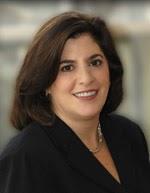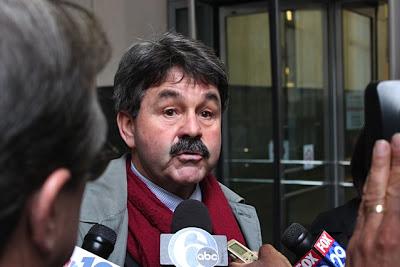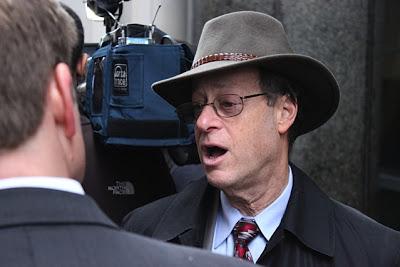Defense Lawyers Allege Prosecutorial Misconduct, Judicial Errors
By Ralph Cipriano
Lawyers for Bernard Shero and Father Charles Engelhardt have filed legal papers claiming their clients were wrongly convicted due to judicial errors and prosecutorial misconduct.
The lawyers made their claims in separate documents filed on Aug. 1 with Judge Ellen Ceisler, both entitled, "Defendant's Statement of Errors To Be Complained Of On Appeal."
Michael J. McGovern, writing on behalf of Father Engelhardt, asserted that Judge Ceisler should have tossed a conspiracy charge against Father Engelhardt a lot sooner than she did. During the trial, the judge overruled defense objections to the charge that Father Engelhardt had conspired with Father Edward Avery to rape Billy Doe, the victim in the case, when he was a 10-year-old altar boy.
After the jury delivered its verdict and convicted Engelhardt of conspiracy, the judge at sentencing announced she was going to throw out the conspiracy charge as unproven. But that decision came after the judge had given "lengthy and repetitive jury instructions on conspiracy and accomplice liability thus unduly emphasizing" the conspiracy charge to the jury, McGovern wrote. The conspiracy charge took up 10 out of 44 pages of jury instructions, and one page of a two-page jury verdict sheet that listed "four separate charges of conspiracy and accomplice liability," McGovern wrote.
This was "an error which the court conceded post-trial," McGovern wrote, when the judge tossed the conspiracy charge. The judge's actions may have resulted in Engelhardt not receiving due process or a fair trial, McGovern wrote.
On Jan. 30, a jury convicted Father Engelhardt of endangering the welfare of a child, corruption of a minor, indecent assault on a person less than 13 years old, and conspiring with Father Ed Avery to commit sexual assault on Billy Doe. On June 12, Judge Ceisler threw out the conspiracy charge, but sentenced the priest to 6 to 12 years in jail.
McGovern said the judge also allowed Assistant District Attorney Mark Cipolletti to "commit prosecutorial misconduct by making highly inflammatory, unsupported and prejudicial statements and misstatements before before the jury, including hypothesizing as to the existence of other victims of sexual assault by [Engelhardt] and suggesting there are countless others known or unknown."
In his summation to the jury, Cipolletti was allowed to imply to the jury that "he had knowledge that there are other sexual assault cases to be brought against [Engelhardt] and implying that the defense counsel was lying, deceitful and manipulative," McGovern wrote.
Here's what the prosecutor said that McGovern objected to: "What he [McGovern] didn't tell you was no child, no student has come forward yet." McGovern questioned whether the judge should have granted a mistrial, or given Cipolletti a cautionary instruction.
McGovern also brought up the court crier's reading of an extra offense against Engelhardt, rape of a child, that the priest was not charged with. This error "falsely prejudiced" the defendant, McGovern wrote.
The defense lawyer criticized the judge for not allowing Billy Doe's "medical, mental health, hospital and drug and alcohol treatment records" to be brought in as evidence during the trial, "thereby denying [Engelhardt] "due process and a fair trial."
Since Judge Ceisler closed all pre-trial hearings and motions in the case to the press and public, this was the first mention that the defense had sought Billy Doe's medical records. You can bet the defense will go after these records in the civil case, where Billy Doe is suing the archdiocese for damages. McGovern also wrote Judge Ceisler that he will be asking on appeal "whether the trial court erred and abused its discretion in refusing to grant a continuance or issue a bench warrant for a subpoenaed witness," namely Billy Doe's older brother. According to McGovern, the witness "failed to appear at court ignoring his subpoena." During deliberations, the jury asked Judge Ceisler, "Do we know why" Billy Doe's older brother did not honor the subpoena?" The judge, according to McGovern, responded with "an erroneous and prejudicial answer over defense objection that there was no evidence" that the brother had "received a subpoena." Finally, McGovern plans to raise on appeal the judge's decision to allow the prosecutor to question Ed Avery "concerning four unrelated alleged accusations of abuse where there was no evidence presented at trial." These allegations were "totally irrelevant and unrelated to the charges against [Engelhardt], including conspiracy, and served only to inflame the jury," the defense lawyer wrote. McGovern faulted the judge for overruling defense objections and allowing the prosecutor to question Avery about the other four allegations, when the judge stated it was "proper impeachment" of a witness.
On Jan. 30, a jury convicted former Catholic school teacher Bernard Shero of rape of a child, involuntary deviate sexual intercourse with a child, endangering the welfare of a child, corruption of a minor, and indecent assault. On June 12, Judge Ceisler sentenced Shero to 8 to 16 years in jail.
|
.
Any original material on these pages is copyright © BishopAccountability.org 2004. Reproduce freely with attribution.


